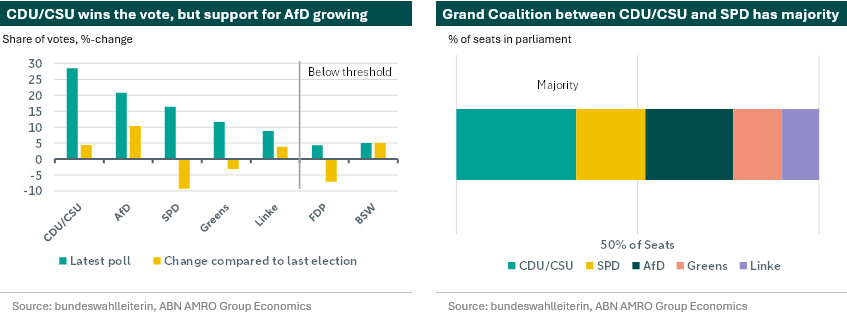German Elections - ‘GroKo’ likely amid further political fragmentation


Friedrich Merz of the Christian democratic CDU/CSU poised to be the next German chancellor – Yesterday, Germany voted in a crucial election impacting not only their economy and domestic policies but also European policy-making amid geopolitical tensions involving Ukraine, NATO, and potential US tariffs.
The highest voter turnout in decades underscored the importance of this election. In line with the polls, the CDU/CSU with leader Friedrich Merz has won the election. This puts the CDU/CSU in the driver’s seat for the coalition talks. Current chancellor Olaf Scholz’s Social Democratic party won just 16.4% of the votes, down around 10% from last election.
The liberal democratic FDP and far-left BSW failed to reach the electoral threshold, thereby boosting the seats of the remaining parties. This makes a two-party majority and the revival of the Groko (Grand Coalition) between the CDU/CSU and the SPD the most likely next coalition. Even more so as the Greens disappointed at just 12% of the votes which does not make them a possible alternative for the SPD.
The election underscored further political fragmentation
While a centrist ‘GroKo’ still seems the most likely outcome, it has to be noted that support for Germany’s traditional big parties has declined as the political landscape has further fragmentated. The far-right Alternative for Germany has recorded its best result yet, now 20.8% of the votes, roughly doubling their backing since 2021. In East-Germany, the AfD was often the biggest party. While Merz has vowed to keep the AfD behind the ‘Brandmauer’ i.e. excluding them from coalition talks, the AfD is set to become a dominant opposition party in parliament.
A new government by Easter?
Merz urged that formation talks should be quick to address the many challenges Germany faces as the “world out there will not wait for us”. As it stands now, and as we have written in our election preview, a new Grand Coalition between the CDU/CSU and the SPD seems the most likely outcome. However formation talks are expected to be difficult. Most importantly as the SPD has clearly lost in the election. While the AfD has been quick to announce their willingness to support a CDU/CSU minority government, Merz has ruled out governing together with the AfD.
Merz inherits a challenged economic growth model
The next coalition will have to face Germany’s stagnating economy caused by a mixture of structural as well as cyclical headwinds which together challenge Germany’s export-led growth model (see here). We do expect some cyclical improvement as consumer demand picks up, rate cuts feed through and frontloading effects – US firms increasing import orders in anticipation of tariffs – provide an impulse to exports. However, structural factors, such as high energy prices, a changed competitive landscape for German exporters and suboptimal infrastructure continue to weigh on the outlook. Together this underpins our expectations for a sluggish but positive growth rate of 0.4% in 2025 up from -0.2% in 2024. Still, Germany is expected to continue underperforming the broader eurozone.
The incoming coalition will struggle to find fiscal room to fund all of its ambitions
Supporting the economy, while reversing the course of infrastructure underinvestment, and ramping up defence spending, is all going to add up. The incoming government faces a difficult landscape how to free up fiscal wiggle room to fund these ambitions. Firstly because the current trajectory of public finances is one of already significant budget deficits. Merz, however, has voiced his intention to cut spending, especially on social programmes and welfare to free up space. The second challenge comes from changing the debt-brake, which looks difficult given the make-up of parliament. Currently the German constitution prohibits a structural deficit larger than 0.35% of GDP. Changing the constitutionally enshrined debt brake requires a two-thirds majority in parliament and the Bundesrat, and with the election results yesterday, the Left and AfD appear to have a blocking minority for any changes to the debt brake.
While a lot is uncertain at this stage, there could be two avenues forward. First, the debt brake has an emergency escape clause, for instance used during the pandemic. It is unclear whether the changing attitude of the US regarding European security and NATO would qualify as such an emergency. Second, the Left has indicated openness to change the debt brake (or allowing the creation of off-balance sheet funds) for instance for infrastructure spending, but is unwilling to do so for defence spending. It remains to be seen whether the incoming coalition can strike a compromise with them.
